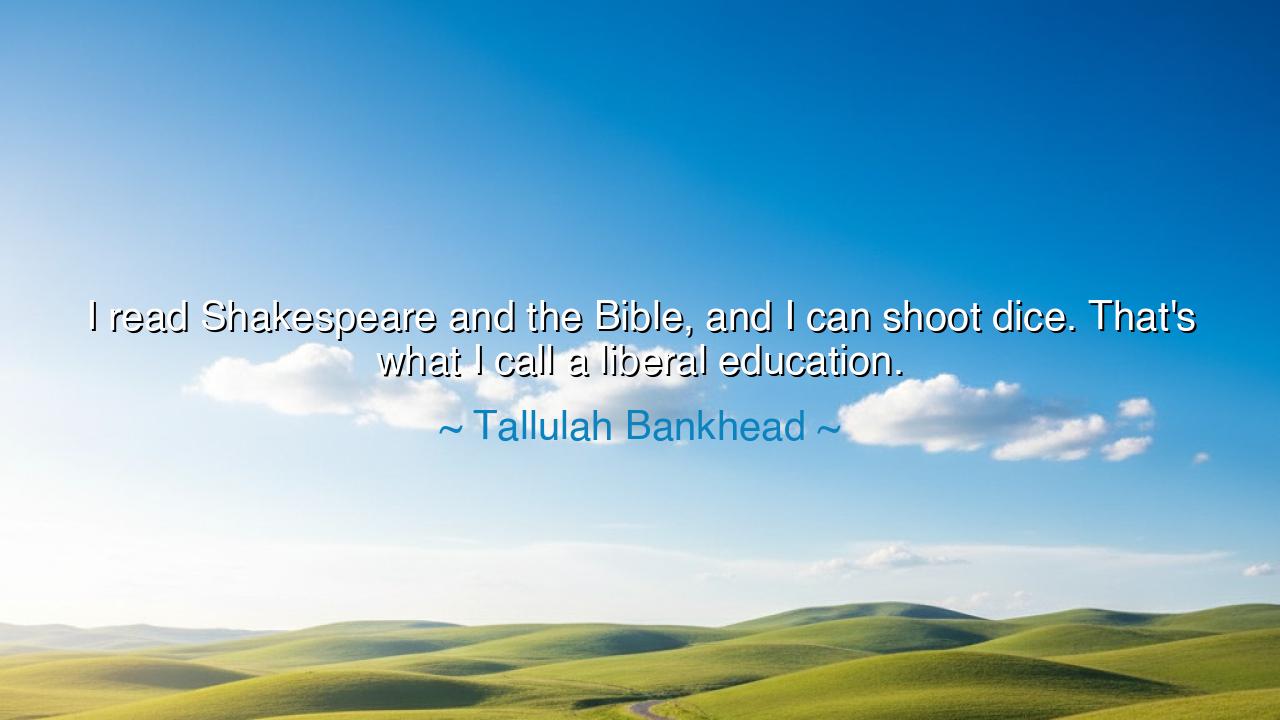
I read Shakespeare and the Bible, and I can shoot dice. That's
I read Shakespeare and the Bible, and I can shoot dice. That's what I call a liberal education.






In the witty and audacious words of Tallulah Bankhead, the great actress of stage and screen, we find a truth that sparkles beneath the veil of humor: “I read Shakespeare and the Bible, and I can shoot dice. That’s what I call a liberal education.” At first glance, it seems a jest — the playful boast of a woman known for her sharp tongue and fearless spirit. Yet beneath her laughter lies a profound understanding of what it means to be educated — not merely in the ways of books and sermons, but in the ways of the world. For Bankhead, to know Shakespeare is to understand the poetry of the human heart; to know the Bible is to grasp the depths of morality and spirit; and to shoot dice is to live amidst the unpredictable, to dance with fate and chance, and to understand that life is not only sacred, but spontaneous.
The origin of this quote springs from Bankhead’s larger-than-life character — a woman of intellect, irreverence, and independence. Born into privilege, yet unrestrained by convention, she embodied both refinement and rebellion. Her definition of a “liberal education” was no accident of wit; it was the creed of one who had lived deeply in both the sanctified and the profane. To her, true learning was not confined to the academy or the pulpit. It was the fusion of culture and instinct, of reverence and rebellion. To read Shakespeare and the Bible was to cultivate the soul, but to shoot dice was to confront the reality of chance — the raw pulse of existence where fortune and failure meet.
In this way, Bankhead joins the lineage of the ancient philosophers, who knew that wisdom cannot be learned from scrolls alone. Socrates walked barefoot through the markets of Athens, speaking not to scholars but to tradesmen and soldiers, for he knew that understanding arises not only in temples of learning but in the bustle of human life. Bankhead, like Socrates, understood that to live fully is to embrace both the sacred and the secular, to see no divide between divine truth and worldly experience. For life itself is the greatest teacher, and those who confine wisdom to scripture and philosophy alone remain blind to the lessons written in laughter, risk, and human folly.
To know Shakespeare, as Bankhead did, is to hold a mirror to the soul of man — to see kings and beggars, saints and sinners, all made of the same fragile clay. To know the Bible is to commune with eternity, to hear the voice of conscience and the murmur of faith. But to shoot dice — ah, that is to understand the hand of fate, the role of chance, the humility of knowing that not all outcomes can be reasoned or controlled. Thus, Bankhead’s triad is a perfect circle of wisdom: the mind, the spirit, and the instinct, united. The educated soul, she suggests, must walk with both the philosopher and the gambler, with reverence and daring in equal measure.
Consider the story of Benjamin Franklin, the philosopher of the New World. He was a man of letters and reason, a reader of Scripture and a student of the classics. Yet he also roamed the taverns, spoke with sailors and craftsmen, and learned from the pulse of common life. His education, like Bankhead’s, was not confined to books but expanded through experience. He understood that wisdom without practicality is like light without warmth. The truly educated, whether Franklin in his workshop or Bankhead at her gaming table, are those who can move with grace between worlds — from the cathedral to the street corner, from contemplation to action.
Bankhead’s jest also hides a challenge. In her era — and in ours — education is often mistaken for accumulation, a piling of facts rather than a widening of perspective. But she reminds us that wisdom is wholeness. It is not only the knowledge of literature and theology, but the courage to live, to err, to risk, to laugh. To “shoot dice” is not merely to gamble — it is to accept life’s uncertainty with boldness, to meet fortune not with fear but with flair. In that sense, her words are not irreverent; they are profoundly human. For even in our sacred texts and our greatest plays, the same truth resounds: that man must live, not merely study living.
The lesson, then, is this: seek not only the education of the mind, but of the heart and the hands. Read deeply, yes — study the poets and prophets — but also step into the world with daring. Speak with strangers, travel, fail, risk, and laugh. Let Shakespeare teach you of the soul, the Bible of the divine, and the dice of the world’s unpredictability. For only when wisdom is lived does it become true. The greatest education is not found in classrooms, but in the full embrace of life — in reverence and rebellion, in thought and in action.
So, my listener, remember Tallulah Bankhead’s immortal wit. Do not divide the sacred from the profane, nor the scholar from the adventurer. For a liberal education — a free, full, fearless education — is the mastery of both the soul and the street, of reason and chance. Read the wisdom of the ancients, pray with the saints, and when the moment calls — throw the dice with courage. For in the blending of heaven’s insight and earth’s laughter lies the truest form of knowledge: a life fully understood, and therefore, fully lived.






AAdministratorAdministrator
Welcome, honored guests. Please leave a comment, we will respond soon